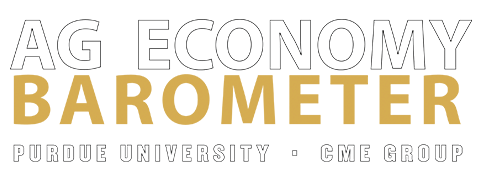August 24, 2020
Thinking About Choosing A Marketing Advisor?
by James Mintert
Farm operations often rely on consultants for a wide variety of services ranging from agronomic and animal nutrition services to tax and legal advice. But less common among farm operations is the use of a marketing advisor. In a recent Purdue University-CME Group Ag Economy Barometer survey of crop and livestock farms, just over 2 out of 10 farms indicated they work with a marketing advisor. In a follow-up question within the same survey, virtually all of the farms working with a marketing advisor said they follow their advisors’ recommendations closely, suggesting that the advisor is contributing to the success of their farming operation.
An old management adage says that no one plans to fail, but if we fail to plan, we often set ourselves up for failure. Developing a marketing plan for your farming operation will be key to improving your farm’s financial performance over the long-term. Unfortunately, many farming operations either don’t have a marketing plan or the plan they have is not well adapted to their situation. Hiring a marketing advisor that helps you develop a systematic approach to managing risk, which includes development of a marketing plan that fits your operation, can help improve your farm’s financial performance.
Farm marketing advisors are not one size fits all. Before embarking on a search for a farm marketing advisor, think about what your objectives are in hiring a market advisor and making sure that your objectives are realistic and match up with what the advisor can provide. To help you do that, the following key considerations will help you choose a marketing advisor that fits you and your farming operation.
A good marketing advisor will want to know how much risk you are willing and able to absorb. Are you in a strong equity position willing and able to absorb risk to improve returns? Or perhaps you’re in a strong equity position but, given the stage of your career, you want to reduce your risk exposure. Or are you in a low equity position that cannot absorb much downside risk? A good understanding of your risk bearing ability will help a marketing advisor work with you to effectively manage your farms’ risk exposure.
You’ll need a marketing advisor who will work with you to learn about your farm and help you jointly define realistic objectives for your operation. For example, do you have a good handle on your production costs per hundredweight or per bushel? An advisor can help you identify your costs which, in turn, can be used to identify pricing targets. Establishing realistic pricing targets can be key to improving your farm’s marketing performance. At the end of the day, you need to decide on the pricing targets, but an advisor can work with you to help identify those targets.
A marketing advisor will need to know which marketing alternatives or tools you are open to using and, in turn, you need to be comfortable with the tools the advisor is encouraging you to use. For example, are futures contracts part of your marketing tool kit? Are you comfortable with potentially having to make margin calls if a futures position moves against you? Do you have financing available to manage potential margin calls that might arise when using futures contracts for long or short hedges? Are you comfortable with the use of put and call options on futures contracts as part of your marketing program? You and your marketing advisor need to be on the same page concerning marketing tool usage, so you’ll need to make sure your advisor knows which tools you’re willing and able to use. A mismatch between you and your advisor on marketing tool usage will lead to problems sooner rather than later.
Monitoring cash markets and basis is an important part of a successful marketing program. Does your marketing advisor monitor cash prices? Does the advisor routinely track basis in your region? If you use futures to hedge your cash market sales or purchases that will take place in the future, after the hedge is placed the basis at which you execute the cash market sale or purchase will have a big impact on your net price and your net returns. Understanding your local basis patterns is an important component of a successful marketing program and a topflight marketing advisor will monitor local basis and help you make sales and purchases at advantageous basis levels.
Communications are important and knowing how and when you will communicate with your advisor is important. Do you want to receive information via text, email or a phone call? How often do you expect to meet with your advisor, and will the meetings be in-person, via phone or perhaps a web-based meeting platform? You both must understand how the lines of communication will work for the relationship to be successful.
Finally, before making a final decision on a marketing advisor, you should ask about your advisor’s track record and how the advisor expects to be compensated. But remember when evaluating an advisor’s track record, that it’s not about capturing the market highs for sales and market lows for purchases. There’s no empirical evidence that any individual advisor or firm can consistently, over long periods, identify market tops or bottoms. Instead, look for an advisor that can provide evidence of successful marketing plan development and execution. If you and your advisor agree on a marketing plan at the outset of each year and then do a good job of executing the plan, you’ve shifted the odds of your farm’s future success in your favor.

TAGS:
TEAM LINKS:
RELATED RESOURCES
Margaret Lippsmeyer, Michael Langemeier, James Mintert, and Nathan Thompson segment U.S. farms by farm resilience, management practices, and producer sentiment. This paper was presented at the Southern Agricultural Economics Meeting in Atlanta, Georgia in February.
READ MOREUPCOMING EVENTS
We are taking a short break, but please plan to join us at one of our future programs that is a little farther in the future.




